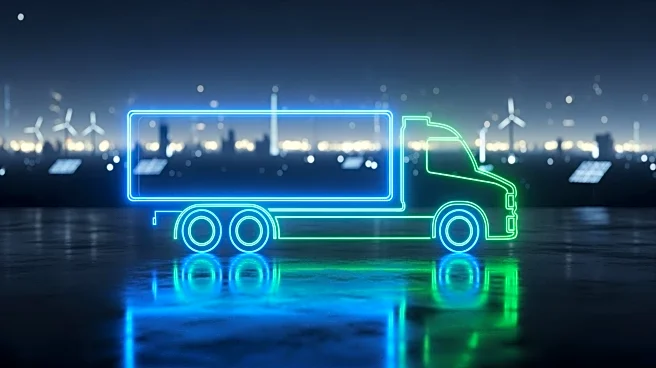What's Happening?
Volvo Trucks has introduced a new stop/start engine feature for its non-American cabover models, aimed at enhancing fuel efficiency and reducing CO2 emissions. This innovation is part of Volvo's broader decarbonization strategy and will be available on the
Volvo FH and FH Aero models starting November 2025. Concurrently, the New Jersey Economic Development Authority (NJEDA) has launched the $50 million Take Charge Program to expand electric vehicle charging infrastructure for commercial fleets in New Jersey. This initiative, under Governor Phil Murphy's leadership, aims to support the state's transition to a cleaner environment by providing financial assistance for EV charging infrastructure. The program is funded through the Regional Greenhouse Gas Initiative and offers up to 50% coverage of project costs for eligible commercial organizations.
Why It's Important?
These developments signify a significant push towards reducing carbon emissions and promoting sustainable transportation solutions. Volvo's new engine technology could lead to substantial fuel savings and lower emissions for heavy-duty trucks, aligning with global efforts to combat climate change. Meanwhile, NJEDA's program supports the growth of electric vehicle infrastructure, which is crucial for the widespread adoption of electric vehicles. This initiative not only aids in improving air quality but also supports economic growth by reducing operational costs for businesses. The combined efforts of Volvo and NJEDA highlight a growing trend towards electrification in the transportation sector, which could have long-term benefits for the environment and the economy.
What's Next?
As these programs roll out, stakeholders such as commercial fleet operators and environmental groups will likely monitor their impact closely. The success of Volvo's new technology could encourage further innovations in fuel efficiency, while NJEDA's program may serve as a model for other states looking to expand their EV infrastructure. Businesses adopting these technologies and programs may experience reduced costs and improved sustainability metrics, potentially influencing industry standards and practices. Continued investment and policy support will be critical to sustaining momentum in fleet electrification and achieving broader environmental goals.















